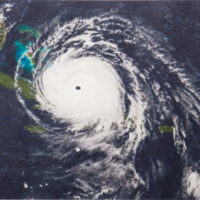Emotional Trauma Caused by a Hurricane

Although we talk often of the financial losses associated with hurricanes, we do not want to minimize the emotional distress that many people feel following a storm. Homeowners and government officials alike can feel incredible stress, some of them even showing signs of post-traumatic stress disorder (PTSD). A new study focusing on Puerto Rico illustrates the breadth of the problem on impacted professionals in health care and social services following Hurricane Maria.
High Rates of PTSD
Researchers at the University of Illinois analyzed the levels of PTSD and anxiety a year after Hurricane Maria struck Puerto Rico, and what they found was startling. Almost half (49%) of health care and social workers had PTSD a full year after the storm. Another 32% reported at least moderate anxiety symptoms.
These numbers were much higher than the rate of PTSD for comparable professionals in Texas after Hurricane Harvey. There, about 20% met the diagnostic criteria for PTSD—which is still incredibly high. Another 19% reported anxiety symptoms.
This study shows that hurricanes have a devastating impact on the mental health of those people tasked with trying to help others. We should not be surprised. Almost a half year after Maria struck, over 1.2 million people remained without power and thousands of people struggled to find shelter and clean water. The ability of government officials to help was very constrained, which is heartbreaking.
The General Public Can Struggle with PTSD Also
Government officials and social workers often feel doubly stressed—as survivors of the storm themselves and as people trying to help the public, which is also in distress. For this reason, we shouldn’t be surprised if their rate of PTSD and anxiety disorder are higher than for the public at large.
Still, anyone who survives a storm can struggle with emotional distress. According to some estimates, up to 1 in 10 people who survive a powerful storm can develop PTSD symptoms within six months of the disaster. Symptoms include flashbacks, nightmares, and trouble sleeping. Depression and anxiety are also concerns.
If you experience any of these symptoms, seek professional help immediately. PTSD is a serious condition that will not disappear “on its own.” Instead, medication and behavioral therapy are often necessary to help the patient begin to get control of the situation.
Shelter Problems Contribute to Stress
Not having electricity, clean water, and a safe roof over one’s head adds to the stress of those who survive a hurricane. Those with insurance should be able to seek shelter elsewhere if their property was damaged, with the costs being picked up by their insurer. Your insurer might also cover certain expenses, such as the cost of food and transportation.
At Bundza & Rodriguez, P.A. our Daytona Beach hurricane insurance claims lawyers are happy to help those struggling to get an insurer to pay their temporary shelter expenses. Some insurers use a disaster as a pretext for denying legitimate claims, at a time when you need help the most.
Contact us today to schedule a free consultation. You can call 386-252-5170 or submit an online message.
Resource:
medicalxpress.com/news/2020-04-emotional-distress-year-hurricane-puerto.html
cbsnews.com/news/hurricane-maria-harvey-irma-ptsd-mental-health/
https://www.daytonalawyers.com/how-to-protect-important-documents-during-a-hurricane/

